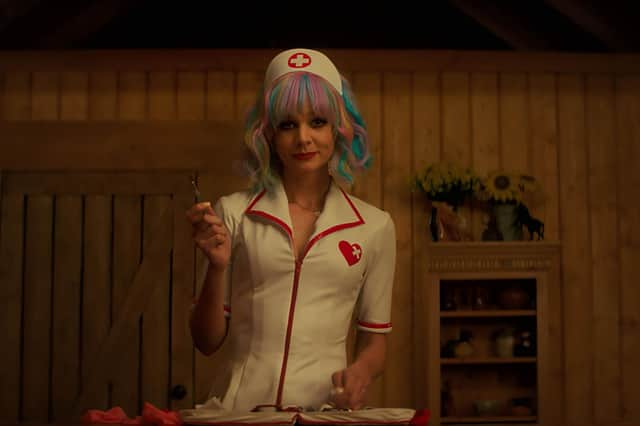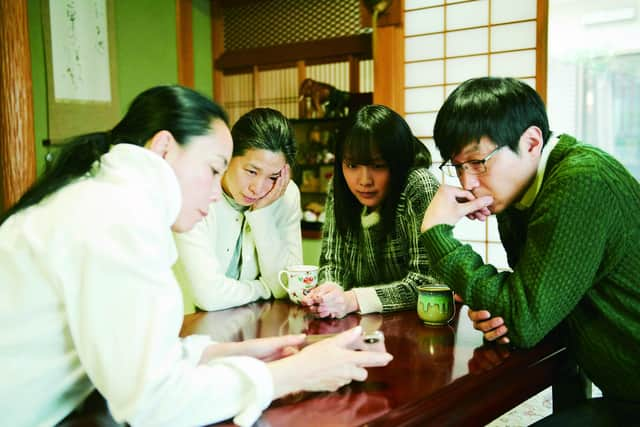Film reviews: Promising Young Woman | True Mothers | Clipboard Jungle


Promising Young Woman (15) ***
True Mothers (N/A) ***
Clapboard Jungle (15) ***


"What is this, the 90s?” proclaims one of the many reprehensible characters in Promising Young Woman, Emerald Fennell’s blackly comic, newly crowned BAFTA-winner about a medical school drop-out (Carey Mulligan) on a mission to avenge her best friend following a sexual assault seven years earlier.
Coming where it does in the film, the line feels like a blatant reference to Peter Berg’s 1998 comedy Very Bad Things, and if you know the basic plot of that film it’ll likely play as a grimly ironic gag, a way to link the jokey mainstream normalisation of lad and frat-boy culture in the late 1990s to the rape culture epidemic that the film presents as the lethal reality of the current moment. But it also complicates the film’s purpose by drawing attention to its own insouciant, very stylised take on violence and amorality, not least in its problematic finale, which is designed to deliver the kind of cathartic comeuppance of a rape-revenge fantasy, but only works if you avoid drawing too much of a distinction between the figurative and literal meaning of someone’s life being over.
Advertisement
Hide AdThat ending can make it easy to dismiss the film as an empty provocation — as I did when I first saw it the Glasgow Film Festival back in 2020 — but there’s also much to admire here, starting with Mulligan’s Cassie, who pretends to get blind drunk in bars as part of a bait-and-switch ruse to expose self-proclaimed nice guys for the wolves in sheep’s clothing they really are. Keeping a colour-coded tally of her exploits, her mission is an unnerving one and the shrewd casting of Mulligan — here playing the antithesis of her waiting-to-be-saved damsel-in-distress in the equally stylised Drive — adds to the film’s discombobulating effect, especially as a random encounter with an old classmate (played by Bo Burnham) simultaneously offers a rom-com style respite from her own misanthropic downward spiral and gives her a more focused target for the vengeance she seeks for her best friend Nina, whom we only ever see in photographs.
The latter can make Cassie feel like a throwback to the diabolical femme fatales of 1990s classics Basic Instinct and The Last Seduction as she sets in motion ever-more elaborate schemes to force people to confront their complicity in Nina’s demise. But a throwaway reference to another of that decade’s staples, Single White Female, offers more of a clue to Cassie’s own psychological make-up, hinting at mental health problems that predate the trauma she’s attempting to exorcise by appointing herself as Nina’s avenging angel. Fennell — hitherto best known for playing Camilla Parker Bowles in The Crown and show-running the second season of Killing Eve — doesn’t concern herself too much with plausibility here; the cartoonish colour-schemes designed to reinforce Cassie’s own state of arrested development also reinforce the cartoonish exaggeration of a plot that depends on no one ever calling the cops on Cassie, even her old college dean (Connie Britton), whose teenage daughter she at one point threatens in order to make a point about not giving men the benefit of the doubt. But this heightened, candy coloured hell-scape is also a way to symbolically prevent Cassie’s fury from slipping into a he- said/she-said grey zone, which gives the film an effective bluntness, even as it ultimately embraces the same 90s cinematic tropes it thinks its subverting.


Adoption drama True Mothers is the latest from Japanese auteur Naomi Kawase and, like her 2016 film Sweet Bean, it operates in such a gentle manner you can practically feel the camera giving the characters a protective hug. It’s the story of Satoko (Hiromi Nagasaky) whose nice but anxiety riddled life with her husband and their sweet-natured six-year-old son is upended by a young woman claiming to be her son’s real mother. Though flirting with the conventions of a mystery, the film reveals itself to be more of a compassionate study of the complexities of parenthood as the film’s flash-backing narrative repeatedly switches between Satoko’s journey to become a parent and that of Hikari (Aju Makita), a pregnant school girl who gives up her son and drifts into a life where exploitation is rife. It takes much longer to get where its going than the story really justifies, but it’s a warm, engaging film nonetheless.
Following the years-long exploits of independent horror filmmaker Justin McConnell to achieve some kind of career breakthrough, Clapboard Jungle doesn’t so much capture lightening in a bottle as document the Sisyphean struggle required to get anywhere in the film business. Part video diary, part inquiry into the wider industry, the film dispels the myth that there’s any glamour in low-budget filmmaking, in part because the democratisation of filmmaking in the digital age has created a glut of content that makes it harder to get anything seen, good or bad. McConnell is realistic about his abilities and prospects here: he’s not some delusional neophyte in the American Movie-mould. But interviews conducted with the likes of Guillermo Del Toro and the late George Romero continue to serve as inspiration and, as he plugs away and broadens his skills, the flickers of success he experiences are accompanied by a dawning realisation that enjoying the journey he’s committed himself to pursuing is perhaps where true career satisfaction lies.
Promising Young WOman is on Sky Cinema and streaming service NOW from 16 April, True Mothers is available on demand from Curzon Home Cinema from 16 April, Clapboard Jungle is streaming on Arrow from 16 April.
A message from the Editor:
Thank you for reading this article. We're more reliant on your support than ever as the shift in consumer habits brought about by coronavirus impacts our advertisers.
If you haven't already, please consider supporting our trusted, fact-checked journalism by taking out a digital subscription at https://www.scotsman.com/subscriptions